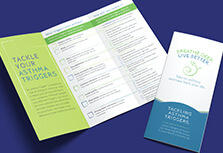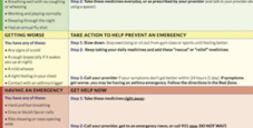Breathe Easier: Protect Yourself from Secondhand Smoke & Asthma Triggers
There is no safe exposure to secondhand smoke or e-cigarette emissions. In fact, smoke of all types is a common trigger for people with asthma, especially children and babies.
Breathing just a small amount of secondhand smoke that contains thousands of chemicals can cause a severe asthma attack. Emissions from vaping contain ultrafine particles, metals and toxins that are known to trigger an asthma attack.
The good news? Simple steps help limit your exposure and breathe easier.
How to Reduce Your Risk
- Keep Your Home Smoke- and Vape-Free: Make your home 100% smoke- and vape-free—even smoking near open windows lets toxins in.>
- Smoke and vape chemicals can cling to clothing, so store worn items separately and ask visitors to leave belongings outside.
- Designate a smoking or vaping area outdoors away from entryways and family spaces, with sealed bins for butts.
- When moving, consider smoke- and vape-free housing.
- Never allow smoking or vaping inside your vehicle—even with the windows down. It is illegal to smoke or vape in a car with a child under 8.
- Replace your ashtray with spare change or gum to resist the urge to smoke.
- Store your cigarettes and vaping supplies in your trunk when driving to make them less accessible.
- Remind passengers not to smoke or vape in your car to protect everyone’s health.
- Minimize Exposure in Public: Avoid areas where people commonly smoke or vape, including outdoor seating and building entrances.
- Visit smoke-free businesses, restaurants, and public spaces that prioritize clean air policies.
- Stand upwind of people who are smoking to avoid inhaling secondhand smoke.
- Ask for smoke-free policies in your workplaces—speak with employers to encourage smoke-free rules to protect everyone from exposure.
- Avoid Scents and Fragrances That Can Trigger an Attack:
- Avoid scents and fragrances like perfumes, scented candles, air fresheners, essential oils, purifiers and cleaning products.
- Use fragrance-free alternatives.
- Quit Smoking and Vaping: Quitting smoking or vaping is the most powerful step you can take for your health and the health of your family. Free help is available to make quitting easier and more successful.
- Seek free support from 802Quits.org, which offers coaching, nicotine replacement therapy, and quit rewards up to $250.
- Set a quit date and remove cigarettes, vaping supplies and triggers from your environment.
- Talk to a health care provider about medications or other strategies that can help you quit for good.








